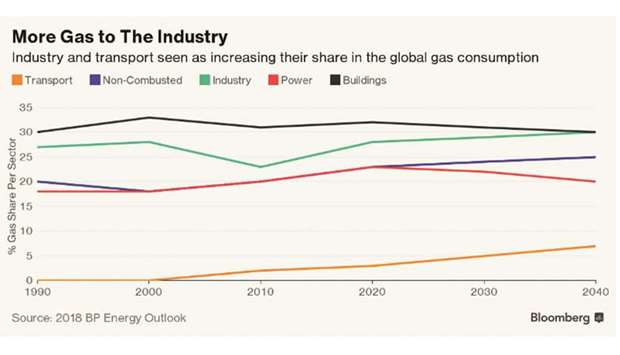Natural gas tries to eke out a future in greener world

Bloomberg/Frankfurt
The natural gas industry is trying to up its green credentials as it bids to join electric cars and renewable power plants in a lower-emission future.
European energy companies spent years touting the role gas can play as a transition fuel to replace dirtier sources of round-the-clock power. Now they are increasingly promoting gas as a cleaner alternative to oil products in transportation and investing in technology to produce less-polluting fuel.
“Natural gas will play a bigger role in a greener world,” Guy Smith, head of gas trading at Swedish utility Vattenfall AB, said on Tuesday. “It will be the fuel of choice for an intermediary situation towards a greener economy, and after that, new technologies will come and drive the markets.”
With governments and investors increasingly concerned about climate change, and meeting in Poland for UN climate talks, the natural gas industry has questioned its own survival. The fuel’s share in primary energy supply is expected to rise to a quarter by 2040, though annual consumption growth is expected to slow to 1.6% from 2.3% over the 25 years to 2016, according to the International Energy Agency.
The fact that natural gas is less polluting than other fossil fuels, with emissions as much as 55% below those of coal, have made it an energy company darling. Companies from Scania AB to Royal Dutch Shell Plc are investing to increase the role of natural gas in the transportation sector.
“The view that gas is just a transition fuel is changing,” said Eva Hennig, chairwoman of the distribution system operators committee at Brussels-based industry lobby group Eurogas.
Austria’s OMV AG is assessing a liquefied natural gas corridor for trucks from Germany to Bulgaria, one of the main traffic routes for international heavy traffic in Europe, it said in an emailed statement. The company, which operates more than 2,000 filling stations in 10 countries, declined to provide more details on the investment.
“If you want to stay in the game, you have to play it and decarbonise,” said Kaloyan Tsilev, EU affairs manager at Brussels-based lobby group Natural & Bio Gas Vehicle Association Europe. “Change the portfolio to accommodate the demand.”
Shell expects the global market for LNG as a transport fuel to quadruple by 2030 as implementation of government policies that tax carbon emissions prompts demand for cleaner sources.
“Transport is an area where gas hasn’t played a role historically, but it can,” Steve Hill, executive vice-president at Shell Energy, said at a conference in Lisbon last month. “Cars will be electrified eventually, but heavy-duty transport, where you have to move heavy loads long distances is not very suitable for batteries and electricity, which can be a segment for LNG.”
The challenge for natural gas to expand into transportation is the lack of political will and a better regulation framework, according to Manfred Leitner, an executive board member at OMV. Current European legislation focuses on vehicles emissions, which put electric cars in a better position than other technologies.
“There are incentives only for electric cars. They are defined as low emitters, but when you look at the whole chain you ask yourself where the electricity comes from?,” Leitner said in a telephone interview. “The gas for mobility market would fly if there was political will. We see a better future with a mix of technologies.”
Natural gas companies are also investing in technology to clean the fuel. Green gas should help Engie SA, Snam SpA, Gas Natural SDG SA and other electricity generators as well as operators of gas pipelines and storage facilities to ensure long-term demand for existing infrastructure, Elchin Mammadov, a Bloomberg Intelligence industry analyst, said in a recent
report.
“The decarbonisation of gas is possible and is a very important part of the narrative of the climate talks” taking place this week in Poland, said Dr Ludwig Mohring, head of German oil, gas and geothermal energy lobby BVEG said at a conference in Berlin last month. “Natural gas will be the second element next to renewables.”